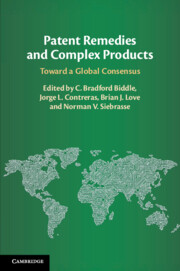Patent Remedies and Complex Products
Through a collaboration among twenty legal scholars from eleven countries in North America, Europe, and Asia, Patent Remedies and Complex Products presents an international consensus on the use of patent remedies for complex products such as smartphones, computer networks, and the Internet of Things. It covers the application of both monetary remedies like reasonable royalties, lost profits, and enhanced damages, as well as injunctive relief. Readers will also learn about the effect of competition laws and agreements to license standards-essential patents on terms that are “fair, reasonable, and nondiscriminatory” (FRAND) on patent remedies. Where national values and policy make consensus difficult, contributors discuss the nature and direction of further research required to resolve disagreements. This title is also available as Open Access on Cambridge Core at 10.1017/9781108594981.
C. Bradford Biddle is Principal at Biddle Law PC and Faculty Fellow at the Center for Law, Science and Innovation, Sandra Day O’Connor College of Law, Arizona State University (ASU). He has taught courses on technology standard setting and internet law as an Adjunct Professor at ASU and elsewhere, and was a Fellow with Stanford Law School’s Center for Internet and Society.
Jorge L. Contreras is a Professor of Law at the S. J. Quinney College of Law, University of Utah. He is the editor of five books, has published more than 100 articles and book chapters, and has served on high-level advisory boards at the US National Institutes of Health, National Academies of Science and American National Standards Institute, among others.
Brian J. Love is an Associate Professor of Law at School of Law, Santa Clara University, California, where he serves as Co-Director of the School’s High Tech Law Institute and teaches courses in intellectual property law and remedies. Prior to joining Santa Clara, Brian was a Teaching Fellow at Stanford Law School a patent litigator, and a law clerk at several courts.
Norman V. Siebrasse is a Professor of Law at the University of New Brunswick, Canada. His research focuses on pharmaceutical patent law, patent remedies and the intersection of intellectual property law and commercial law. His writing is regularly cited by the Canadian courts, including the Supreme Court of Canada. He served as a law clerk at the Supreme Court of Canada.



